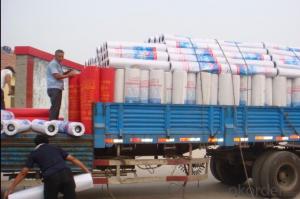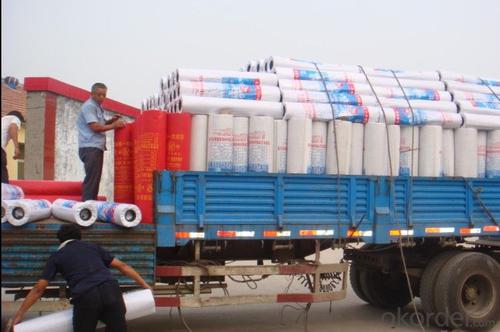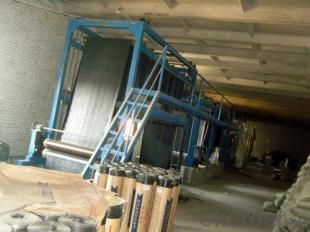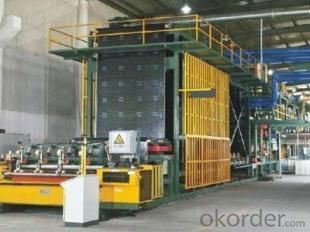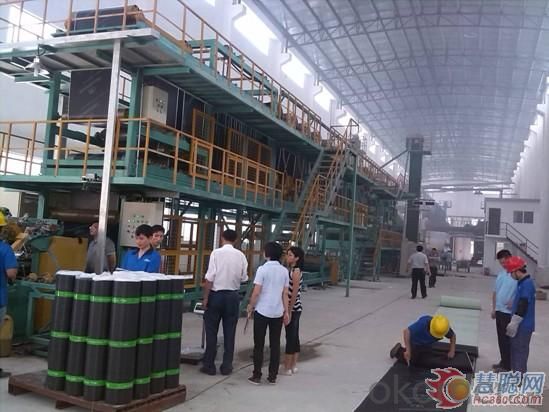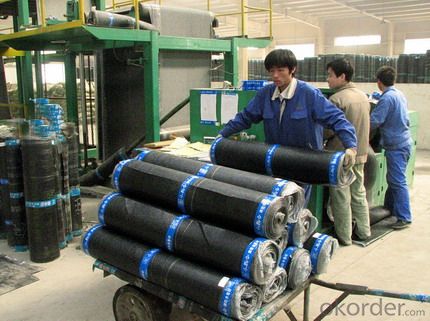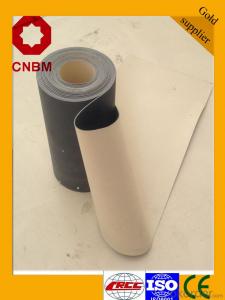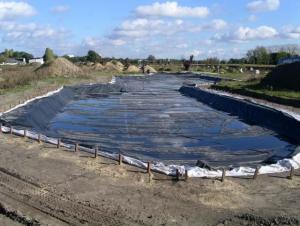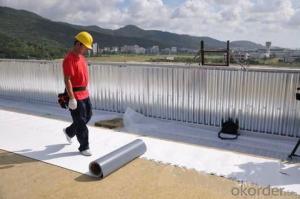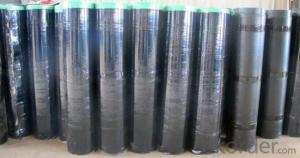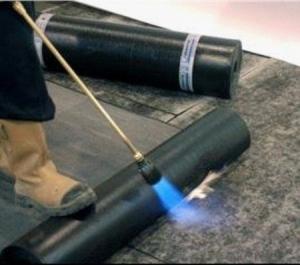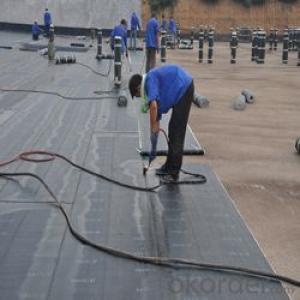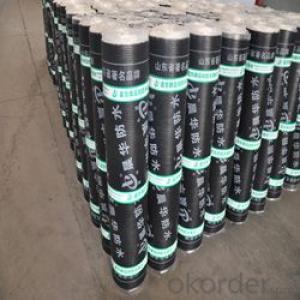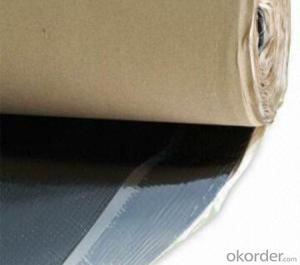SBS Waterproof Material for Construction
- Loading Port:
- Tianjin
- Payment Terms:
- TT OR LC
- Min Order Qty:
- 100 roll
- Supply Capability:
- 100000 roll/month
OKorder Service Pledge
OKorder Financial Service
You Might Also Like
Features:
1) SBS/APP modified bitumen waterproof membrane
2) conforms to the national standards
3) embossed belt and PE waterproof membrane
4) popular in Australia, Korea and the USA
5) technique:spunbond
6) length of roll:10m
7) core material:polyester mat or composite mat
Characteristic:
a) SBS modified bitumen waterproof membrane is specially used as waterproof material in cold area
b) APP is specially suitable for areas of high temperature and of strong sun-shine
SBS/APP Modified Bitumen Waterproof Membrane
c)Good performance in Good impermeability anti-puncture, anti-broker, anti-resistance, anti-erosion, anti-mildew, anti-weathering
d)Possess good tensile strength, elongation rate and size stability which could be well suited the substratedistortion and crack
- Q: Can a waterproofing membrane be used for a bridge deck construction?
- Yes, a waterproofing membrane can be used for bridge deck construction. Waterproofing membranes are commonly used in bridge deck construction to protect the underlying structure from water infiltration, which can cause corrosion and damage over time. The membrane acts as a barrier to prevent water from seeping into the concrete, ensuring the durability and longevity of the bridge deck.
- Q: Can a waterproofing membrane be used in bridge decks or roadways?
- Yes, bridge decks and roadways can benefit from the use of a waterproofing membrane. This protective layer prevents water infiltration and increases the lifespan of the structure. Given the harsh weather conditions and heavy traffic that bridge decks and roadways face, a waterproofing membrane is essential. Water penetration can cause damage to bridge decks and roadways, including corrosion of steel reinforcements and deterioration of concrete. By applying a waterproofing membrane, a barrier is created to prevent water from seeping into the structural elements. This reduces the risk of corrosion and extends the durability of the bridge or roadway. Additionally, a waterproofing membrane can help prevent the formation of cracks and potholes, which are often caused by the freeze-thaw cycle and water penetration. By keeping the surface of the bridge deck or roadway dry, the membrane maintains its structural integrity and avoids costly repairs or premature replacement. It is important to consider factors such as material selection, installation techniques, and maintenance when using a waterproofing membrane in bridge decks or roadways. The chosen membrane should be compatible with the construction materials, and the installation process must be done correctly to ensure a watertight seal. Regular maintenance and inspections should also be done to identify any issues or damage to the membrane. This allows for timely repairs and ensures its effectiveness over time. Overall, using a waterproofing membrane in bridge decks or roadways is an efficient solution to protect against water damage and extend the lifespan of these critical infrastructure elements.
- Q: Can a waterproofing membrane be used for a hotel?
- Indeed, a hotel can benefit greatly from the utilization of a waterproofing membrane. Commonly employed in construction, waterproofing membranes serve as a protective measure against water damage. When it comes to hotels, these membranes can be applied to a multitude of areas, including the roof, foundation, basements, bathrooms, and balconies, effectively averting water leakage and moisture infiltration. Particularly in locales prone to water exposure, such as swimming pools, spa facilities, or regions with heavy rainfall or high humidity, the installation of a waterproofing membrane becomes paramount. By integrating this measure into a hotel, the structural integrity of the building can be upheld, the growth of mold and mildew can be thwarted, and a comfortable and secure environment can be ensured for guests.
- Q: How does a waterproofing membrane handle water migration through the substrate?
- A waterproofing membrane handles water migration through the substrate by forming a barrier that prevents the water from penetrating and reaching the underlying surface. The membrane acts as a protective layer, effectively sealing off the substrate and preventing any water from seeping through.
- Q: SBS waterproofing membrane how to sample
- EPDM membrane, rubber waterproofing membrane: the same manufacturers, specifications are not more than 5000m2 for a group, each batch of 2m2 Rubber water stop: the same manufacturers, specifications taken 2m long Modified asphalt polyethylene tire waterproofing membrane: the same specifications are not more than 1000m2 for a group, each batch of 1 volume
- Q: How are waterproofing membranes installed?
- To safeguard buildings and structures from water damage, the application of waterproofing membranes is essential. Typically, the installation process involves multiple steps. Initially, the designated surface must be adequately prepared. This entails cleansing the surface and eliminating any debris or loose materials. Ensuring the surface is smooth and devoid of irregularities or cracks is of utmost importance. Following this, a primer is administered to the surface. This aids in establishing a robust bond between the membrane and the surface. Typically, a brush or roller is employed to apply the primer, and it is crucial to allow it to completely dry before proceeding to the subsequent step. Once the surface is primed, the waterproofing membrane can be installed. Various types of membranes are available, including sheet membranes, liquid membranes, and peel-and-stick membranes. The selection of the membrane type depends on the project's requirements and the surface being waterproofed. For sheet membranes, the material is typically unrolled and carefully positioned over the primed surface. It is crucial to ensure the proper alignment of the membrane, devoid of any wrinkles or air pockets. Subsequently, the membrane is firmly pressed down to establish a robust bond with the surface. Liquid membranes are usually applied using a brush or roller. The liquid is evenly spread over the primed surface, and multiple coats may be applied to ensure a comprehensive and effective waterproofing layer. Each coat must be allowed to dry before proceeding to the next. Peel-and-stick membranes are the simplest to install. The backing is peeled off the membrane, and it is meticulously pressed onto the primed surface. The adhesive on the membrane's back establishes a strong bond with the surface. Once the membrane is installed, any seams or joints must be adequately sealed. This is typically achieved using waterproofing tape or sealant. The objective is to create a continuous and watertight barrier to prevent any water from penetrating. Overall, the installation process for waterproofing membranes necessitates meticulous preparation, accurate application, and attention to detail. It is crucial to adhere to the manufacturer's instructions and utilize appropriate materials and techniques for the specific membrane being installed. By doing so, a dependable and efficient waterproofing system can be established, safeguarding the building or structure from water damage.
- Q: Can a waterproofing membrane be used in historical or heritage buildings?
- Indeed, historical or heritage buildings can utilize a waterproofing membrane. Nevertheless, prior to implementing any waterproofing solution, it is imperative to take into account the specific requirements and sensitivities associated with these types of structures. Historical or heritage buildings often possess distinctive architectural characteristics, materials, and construction methods that necessitate preservation and safeguarding. When employing a waterproofing membrane in historical or heritage buildings, it is of utmost importance to choose a product that is compatible with the existing materials and will not cause any harm or modification to the structure. It is advisable to seek guidance from a professional architect or preservation specialist with expertise in working with historical buildings. This will ensure that the chosen waterproofing membrane is appropriate for the specific needs of the building. Furthermore, it is vital to consider the visual impact of the waterproofing membrane on the building's appearance. Historical or heritage buildings frequently showcase unique architectural details and façades that contribute to their character and value. Hence, the selection of the waterproofing membrane should be done with great care to ensure that it does not detract from the building's historical significance or visual allure. In conclusion, while it is possible to employ a waterproofing membrane in historical or heritage buildings, it should be done with caution. The utmost consideration should be given to the building's materials, construction techniques, and aesthetic worth to guarantee that the waterproofing solution does not compromise the structure's integrity or historical importance.
- Q: Can waterproofing membranes be installed on uneven surfaces?
- Yes, waterproofing membranes can be installed on uneven surfaces. In fact, one of the advantages of waterproofing membranes is their ability to conform to various irregularities and unevenness in the surface. These membranes are typically flexible and can be easily molded and adjusted to fit the contours of the substrate. Additionally, some waterproofing membranes have self-adhesive properties or can be applied with adhesives, allowing them to adhere to both smooth and uneven surfaces effectively. However, it is important to note that proper surface preparation is crucial for a successful installation. The surface should be clean, dry, and free from any loose materials or debris to ensure optimum adhesion and performance of the waterproofing membrane.
- Q: What is the cost of a waterproofing membrane?
- The cost of a waterproofing membrane can vary depending on factors such as the type and quality of the membrane, the size of the area to be covered, and the complexity of the installation. It is best to consult with manufacturers or contractors to get accurate cost estimates for specific projects.
- Q: Can waterproofing membranes be used in swimming pools?
- Yes, waterproofing membranes can be used in swimming pools. Waterproofing membranes are commonly used in swimming pools to prevent water leakage and to protect the structural integrity of the pool. These membranes are typically made of durable materials, such as PVC or EPDM, that are designed to withstand constant exposure to water and pool chemicals. They are applied to the concrete or other pool structures to create a watertight barrier that prevents water from seeping through. Additionally, waterproofing membranes can also provide protection against cracks, corrosion, and other forms of damage, ensuring the longevity and durability of the pool.
Send your message to us
SBS Waterproof Material for Construction
- Loading Port:
- Tianjin
- Payment Terms:
- TT OR LC
- Min Order Qty:
- 100 roll
- Supply Capability:
- 100000 roll/month
OKorder Service Pledge
OKorder Financial Service
Similar products
Hot products
Hot Searches
Related keywords
